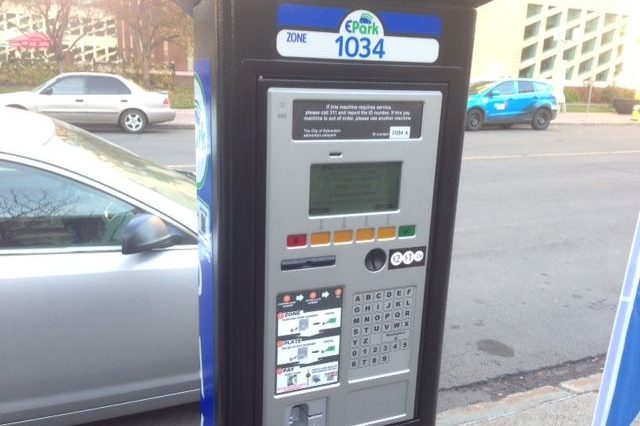More than two years after the city started installing ePark machines to collect payment for parking, figures obtained by Global News show the number of machine errors is on the rise.

New numbers obtained by Global News show that in the 2017 calendar year there were 343 issues because of human error with the ePark machines and 1,270 issues due to a machine error.
The numbers show a 37 per cent jump in machine errors, which accounts for 79 per cent of last year’s ePark issues. The errors are a small fraction of the total 2,188,658 transactions registered last year.

Human errors include customers trying to pay with a card type not accepted by the system, trying to use dirty or damaged coins and inaccurate input of licence plate and zone numbers. Meanwhile, machine errors range from paper jams to blank screens to communication failures.
READ MORE: ePark system launched, set to change parking in Edmonton
“It is definitely increased,” admits Damian Griggs, the manager of technology, innovation and integration with the City of Edmonton’s Parking Services.
“As we’re trying out some of the new technology, we’re doing a lot of programming in the background. There have been notable changes and that does sometimes affect things.”
Last year, a Global News investigation resulting from a Freedom of Information (FOI) request revealed that from November 2015 to December 2016, there were 1,054 issues resulting from human error with the machines and 927 issues as a result of machine error.
READ MORE: Machine errors account for 40% of ePark issues in Edmonton
Brayden Robb uses ePark machines once a month and said he has had some frustrating moments with the devices.
“A couple times where I went to go pay, there was no screen. I couldn’t pay,” he said.
“If it doesn’t work and I can’t pay, I have to go somewhere else. It’s kind of a hassle, right?”
Robb said he wants to see the city update the machines and adds that dealing with machine errors can be annoying.
“It’s frustrating, especially when you have to be somewhere on time and then you’re late because you can’t find parking. Or you have to pay for parking and you can’t, then you’re late, right? It’s just not good.”
RELATED: Edmonton’s ePark meters endure rocky rollout
Griggs said there have been changes to programming to help with what he calls the overall customer experience.
“Even though there has been an increase in the amount of service calls we’ve had in the machines, they’re doing a fantastic job,” he said.
Neville Banak uses ePark machines once every couple of weeks and said he has not had any issues.
“It’s pretty straight forward – enter your licence plate number and just whatever time you want. That’s it. Done,” he said.
“No problem at all. I never have any problems.”
Last year, the city said it was aiming to bring the number of machine errors down to 25 per cent of all service requests; numbers from 2016 show machine errors made up more than 40 per cent of the 1,981 service logs, excluding routine maintenance calls.
Griggs said efforts to continually improve the machines may be part of the issue.
“I’m actually sure we could probably reach 25 per cent if we stopped trying to be innovative,” he said.
“As we look at each of the pieces of technology that we can improve upon, it does bring in the chance of increased errors because we’re potentially trying something no one has tried before. Because you are trying leading-edge technology, sometimes there are things you just don’t know until you actually had users go in and try it out.”
Griggs said the city hopes to decrease the number of machine error issues by standardizing the technology being used.
The overall number of service requests and issues with human error have gone down since the last reporting period; Griggs credits the decrease with better reporting and data on the ePark machines and making changes to help with user experiences, respectively.
Installation of the machines started in October 2015 and the last coin meter was removed in April 2016.
The city plans to publish an annual report on ePark machines, issues and patterns with the devices; it is expected to be available at the end of the first quarter every year.
Do you have a story related to ePark or want something investigated? Email julia.wong@globalnews.ca


Comments